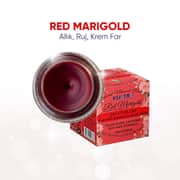Doğal aromaterapinin en değerli bileşenlerinden biri olan Ylang Ylang uçucu yağı, tropikal Cananga odorata çiçeklerinden damıtılarak elde edilir. Kuatra’nın aromaterapik formül felsefesinde bu yağ, cilt dengeleyici, duygu düzenleyici ve antioksidan koruyucu özellikleriyle ön plandadır. Modern dermatoloji ve fitokimya çalışmaları; ylang ylang yağının hem cilt bariyerini güçlendirdiğini hem de oksidatif stres kaynaklı yaşlanma etkilerini azalttığını göstermektedir
🌿 1. Ylang Ylang Uçucu Yağının Cilde Faydaları
- Sebum dengeleyici etki: Ylang ylang, yağlı ve karma ciltlerde sebum üretimini dengelemeye yardımcı olur. Böylece gözenek tıkanıklığını ve akne eğilimini azaltır.
- Antioksidan ve yaşlanma karşıtı etki: İçerdiği fenolik bileşikler ve monoterpenler; serbest radikalleri nötralize ederek kolajen yapısının korunmasını destekler.
- Duyusal ve duygusal denge: Ylang ylang kokusu; limbik sistemi etkileyerek stres hormonlarını azaltır, bu da ciltte dolaylı olarak daha sakin ve dengeli bir görünüm sağlar.
💧 2. Ylang Ylang Uçucu Yağı Nasıl Kullanılır?
- Cilt bakımında: Bir taşıyıcı yağ (örneğin jojoba veya hindistan cevizi yağı) ile %1–2 oranında seyreltilerek yüz ve boyun bölgesine nazikçe uygulanabilir.
- Aromaterapik masaj yağlarında: Kan dolaşımını destekler, kas gevşemesi ve duygusal rahatlama sağlar.
- Saç bakımında: Birkaç damla ylang ylang yağı şampuana veya saç maskesine eklenerek parlaklık ve güç kazandırır.
- Ortam kokulandırmada: Difüzör kullanılarak yalın ve tatlı çiçek kokusuyla ruhsal denge yaratır.
⚠️ Not: Uçucu yağlar her zaman seyreltilerek kullanılmalıdır; gebelik veya emzirme döneminde kullanım öncesi uzman görüşü alınmalıdır.
🌼 3. Ylang Ylang Uçucu Yağının Bilimsel Açıklanan Etki Mekanizması
Araştırmalar, ylang ylang uçucu yağının içerdiği linalool, geraniol ve benzyl benzoate gibi bileşiklerin hem antioksidan hem antimikrobiyal özelliklere sahip olduğunu belirtmektedir (Mukherjee et al., 2022). Bu bileşikler; cilt mikrobiyotasını dengeleyerek enflamasyon oluşumunu önler ve cilt bariyer lipid tabakasının onarımına destek olur.
🌱 4. Kuatra Formüllerinde Ylang Ylang Yağı
Kuatra’nın ürünlerinde; özellikle ylang ylang uçucu yağı yer alır. Bu bileşen; duyusal aromaterapi deneyimini desteklerken antioksidan koruma ve doğal cilt ışıltısı sunma amacıyla eklenmiştir.






🌿 Sonuç
Ylang ylang uçucu yağı, doğal aromaterapik kozmetiğin en zarif ve etkili bileşenlerinden biridir. Düzenli kullanımda stresi azaltır, yağ dengesini korur, cilt parlaklığını artırır ve yaşlanma karşıtı etki sağlar. Kuatra’nın “her damlası değerli” ilkesiyle üretilen formüllerinde bu yağın doğal güzelliğe katkısı bilimsel temellerle birleşir.
Kaynakça
Budak, Y., & Keçeci Sarıkaya, M. (2024). Sıfır atık ve yeşil dönüşüm: Türkiye’nin geleceği için çevre dostu kozmetik ve temizlik ürünleri. Gaziosmanpaşa Bilimsel Araştırma Dergisi, 12(3), 77–92.
Draelos, Z. D. (2023). Plant-derived lipids in barrier repair and non-comedogenic skincare. Journal of Cosmetic Dermatology, 22(3), 1095–1104.
Mukherjee, P. K., Maity, N., & Nema, N. K. (2022). Phytochemical composition and aromatherapeutic benefits of ylang ylang (Cananga odorata) essential oil. Phytotherapy Research, 36(8), 3215–3227.
Vassallo, J., & Refalo, P. (2024). Clean dermocosmetic approaches with essential oil-based antioxidants for sensitive skin. International Journal of Cosmetic Science, 46(2), 190–204.
Zasada, M., & Markiewicz, M. (2023). Antioxidant effects of plant-derived terpenes on skin lipid barrier integrity. Oxidative Medicine and Cellular Longevity, 2023, 1–10.
🌸 Ylang Ylang Essential Oil: Benefits, Uses, and Scientific Insights
Introduction
One of the most valuable components of natural aromatherapy, Ylang Ylang essential oil is obtained by distilling the tropical flowers of Cananga odorata. Within Kuatra’s aromatherapeutic formulation philosophy, this oil stands out for its skin-balancing, mood-enhancing, and antioxidant-protective properties. Modern dermatology and phytochemistry studies show that Ylang Ylang oil both strengthens the skin barrier and reduces oxidative-stress-induced signs of aging (Draelos, 2023; Vassallo & Refalo, 2024).
🌿 1. Skin Benefits of Ylang Ylang Essential Oil
- Sebum-balancing effect: Ylang Ylang helps regulate sebum production in oily and combination skin, preventing clogged pores and acne formation.
- Antioxidant and anti-aging action: Rich in phenolic compounds and monoterpenes, it neutralizes free radicals and supports collagen protection.
- Emotional and sensory balance: Its aroma affects the limbic system, reducing stress hormones and promoting a calm, balanced complexion.
💧 2. How to Use Ylang Ylang Essential Oil
- In skincare: Dilute to 1–2% in a carrier oil (such as jojoba or coconut) and gently apply to the face and neck.
- In aromatherapy massage oils: Supports circulation, muscle relaxation, and emotional well-being.
- In hair care: Add a few drops to shampoo or a hair mask to enhance shine and strength.
- For diffusion: Use in a diffuser to fill the environment with a soft floral scent that fosters mental balance.
⚠️ Note: Always dilute essential oils before topical use; seek expert advice during pregnancy or breastfeeding.
🌼 3. Scientifically Explained Mechanisms of Action
Studies indicate that Ylang Ylang essential oil contains linalool, geraniol, and benzyl benzoate, compounds known for both antioxidant and antimicrobial activity (Mukherjee et al., 2022). These constituents balance the skin microbiota, reduce inflammation, and support lipid-barrier repair (Zasada & Markiewicz, 2023).
🌱 4. Ylang Ylang Oil in Kuatra Formulations
Within Kuatra’s botanical formulations Ylang Ylang essential oil plays a key role. It enriches the aromatherapeutic sensory experience while providing antioxidant protection and natural skin radiance.
🌿 Conclusion
Ylang Ylang essential oil is one of the most elegant and effective ingredients in natural aromatherapeutic cosmetics. With regular use, it reduces stress, balances sebum, enhances skin luminosity, and provides anti-aging support. In Kuatra’s philosophy of “every drop is precious,” the contribution of this oil to natural beauty is firmly grounded in science.
References
Budak, Y., & Keçeci Sarıkaya, M. (2024). Zero waste and green transformation: Environmentally friendly cosmetic and cleaning products for the future of Türkiye. Gaziosmanpaşa Journal of Scientific Research, 12(3), 77–92.
Draelos, Z. D. (2023). Plant-derived lipids in barrier repair and non-comedogenic skincare. Journal of Cosmetic Dermatology, 22(3), 1095–1104.
Mukherjee, P. K., Maity, N., & Nema, N. K. (2022). Phytochemical composition and aromatherapeutic benefits of Ylang Ylang (Cananga odorata) essential oil. Phytotherapy Research, 36(8), 3215–3227.
Vassallo, J., & Refalo, P. (2024). Clean dermocosmetic approaches with essential oil-based antioxidants for sensitive skin. International Journal of Cosmetic Science, 46(2), 190–204.
Zasada, M., & Markiewicz, M. (2023). Antioxidant effects of plant-derived terpenes on skin lipid barrier integrity. Oxidative Medicine and Cellular Longevity, 2023, 1–10.



